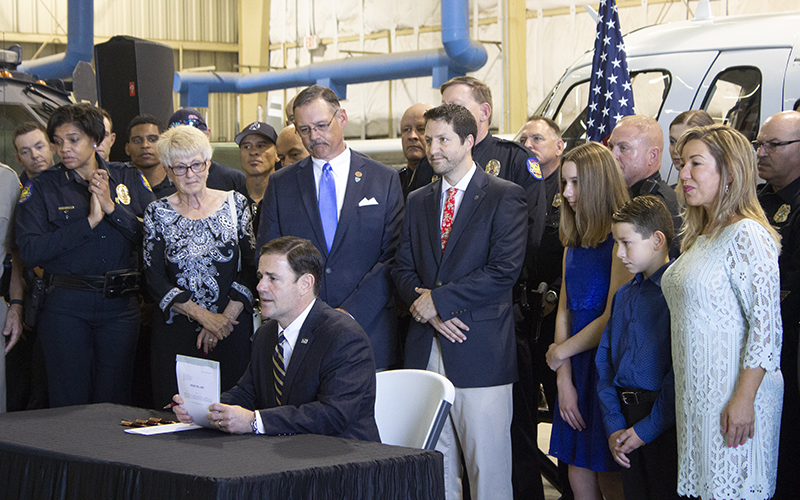
Gov. Ducey poses at the ceremonial signing of the “Officer Craig Tiger Act” alongside the policeman’s family, public officials and several first responders. (Photo by Jennifer Magana/Cronkite News)
PHOENIX – Gov. Doug Ducey on Wednesday signed the “Officer Craig Tiger Act,” which provides more counseling services to public-safety officials who suffer post-traumatic stress disorder because of their experiences on the job.
The law is named after a Phoenix police officer who was forced to shoot an assailant in 2012 and later took his own life as a result of undiagnosed PTSD. But the program is available to officers or firefighters who experience stressful situations from child abuse to witnessing the death of a colleague or near-drownings.

Gov. Ducey and Sen. Rick Gray, one of the bill’s sponsors, attend the ceremonial signing of the “Officer Craig Tiger Act” with the policeman’s widow, Rebecca Tiger, and their two children. (Photo by Jennifer Magana/Cronkite News)
“The death of Officer Tiger was a profound tragedy and deeply wounding loss,” the governor said. “All of us can and must move forward with action to make sure that our amazing officers and firefighters receive the help and care they need and deserve.”
Ducey in 2016 signed legislation creating the Traumatic Event Counseling Program for first responders, which provided up to 12 counseling visits per traumatic event, but the new law covers up to 36 visits with a licensed treatment professional. Also, first responders will not lose pay or benefits if they are deemed unfit for duty, and their employers cannot require them to use paid time-off to attend counseling.
According to the World Health Organization, one person commits suicide every 40 seconds. Public-safety employees are highly susceptible to PTSD, which can greatly affect behavior and produce suicidal thoughts.
Officer Tiger used deadly force against an assailant who was assaulting him and his partner in 2012; he later said his problems began that night. He returned to work but was drinking heavily; that same year, he was arrested for driving under the influence in Coconino County. Tiger was fired by the Phoenix Police Department in 2013 and killed himself in November 2014.
“It means that Craig’s death was not in vain,” his widow, Rebecca Tiger, said of the new law. “Obviously, he suffered from PTSD and died as a result of those injuries. With this bill now, my hope is that it won’t get that far – we won’t lose another first responder to an injury that is treatable.”
Joe Clure, executive director of the Arizona Police Association, recognized Channel 5 (KPHO) reporter Donna Rossi as instrumental in the coverage of PTSD among first responders.
Tiger shared his story with Rossi after he was fired for the DUI and a few months before his death.
“He was very adamant that police departments and fire departments don’t address the issues that are necessary when it comes to officers or firefighters who suffer from PTSD,” Rossi said.
“He felt re-victimized by the department for not recognizing he was suffering from an illness, an illness you might not be able to see. He didn’t feel like they gave enough attention to him, and instead of helping him and treating the issue, that subsequently resulted in alcoholism, (he) was just disheartened.”
The most recent data available within the state reveals 1,310 Arizonans died by suicide in 2016, per the Suicide Prevention Resource Center.
“With this bill, it is our hope that first responders will not have to suffer alone and will have resources dedicated to their recovery from post-traumatic stress,” Clure said.
Follow us on Twitter.